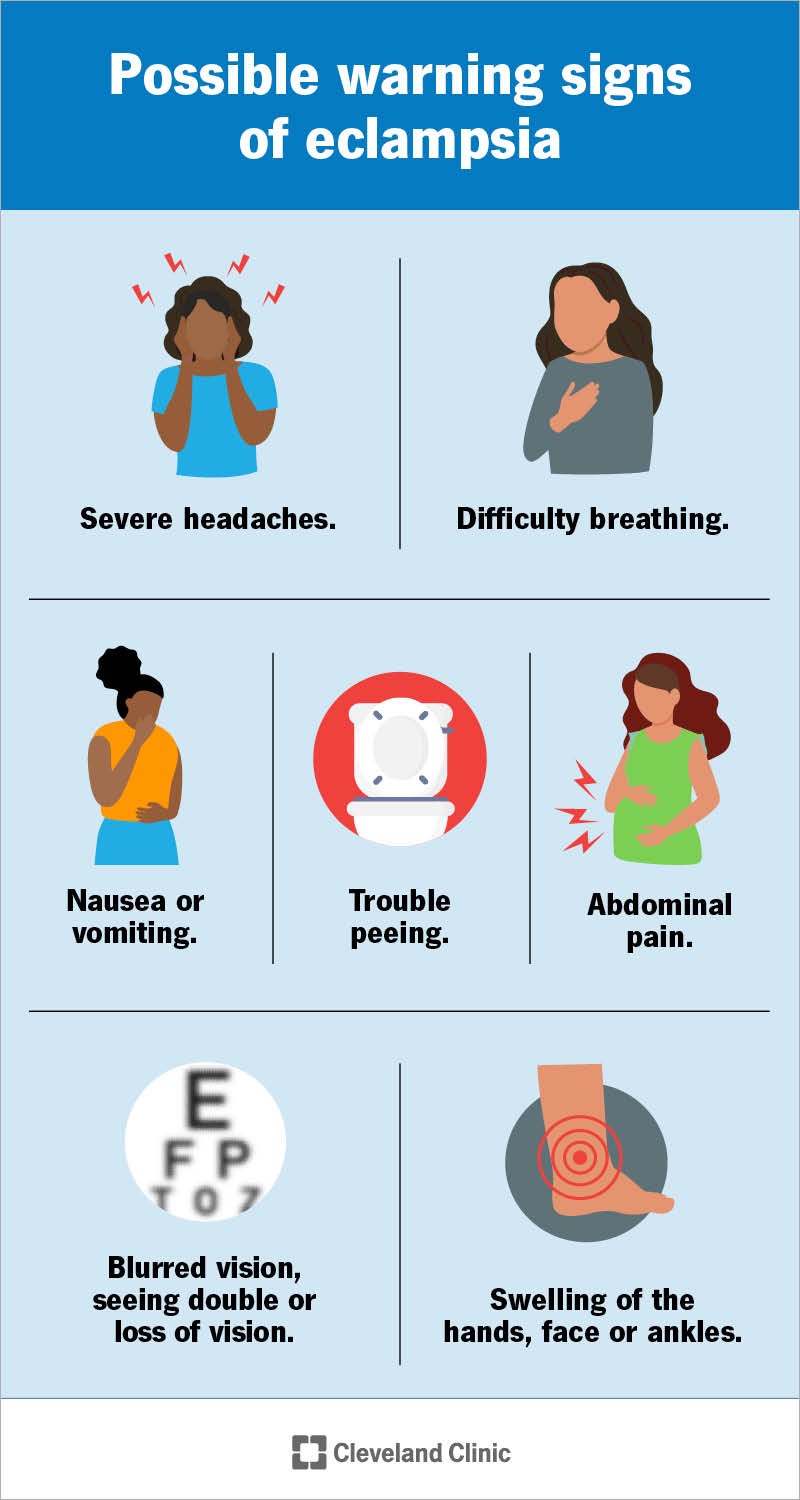Eclampsia is seizures that occur in pregnant women with preeclampsia. Symptoms of eclampsia are high blood pressure, headaches, blurry vision and convulsions. Eclampsia is a rare but serious condition that occurs in the second half of pregnancy.
Advertisement
Cleveland Clinic is a non-profit academic medical center. Advertising on our site helps support our mission. We do not endorse non-Cleveland Clinic products or services. Policy

Image content: This image is available to view online.
View image online (https://my.clevelandclinic.org/-/scassets/images/org/health/articles/24333-eclampsia)
Eclampsia is a rare but serious complication of preeclampsia. Preeclampsia is a disorder of pregnancy in which a person who’s pregnant has high blood pressure and protein in their urine. Eclampsia is when a person with preeclampsia develops seizures (convulsions) during pregnancy. Seizures are episodes of shaking, confusion and disorientation caused by abnormal brain activity.
Advertisement
Cleveland Clinic is a non-profit academic medical center. Advertising on our site helps support our mission. We do not endorse non-Cleveland Clinic products or services. Policy
Eclampsia typically occurs after the 20th week of pregnancy. It’s rare and affects less than 3% of people with preeclampsia. Eclampsia can cause complications during pregnancy and requires emergency medical care.
Eclampsia is a severe form of preeclampsia that causes seizures. It’s considered a complication of preeclampsia, but it can happen without signs of preeclampsia. These seizures can cause confusion and disorientation or put the pregnant woman in a coma. In some cases, it can lead to stroke or death. In most cases, preeclampsia is managed before it progresses to eclampsia. Your obstetrician will monitor you closely throughout your pregnancy and they may prescribe medications. With both conditions, the only cure is to deliver your baby.
The biggest risk factor for eclampsia is preeclampsia. Most people with preeclampsia don’t develop eclampsia. You may also be at higher risk for eclampsia if:
Advertisement
However, you may not have any risk factors.
Many people will have warning signs before having a seizure caused by eclampsia. Some of these signs are:
The most common symptoms of eclampsia are:
Eclampsia typically develops from preeclampsia. High blood pressure (from preeclampsia) puts pressure on your blood vessels. There can be swelling in your brain, which may lead to seizures.
Genetics and diet can increase your risk for eclampsia.
Your obstetrician diagnoses eclampsia based on the presence of a seizure. They will perform an exam, blood work and regular blood pressure monitoring. They also order urine tests to look for increased protein in the urine.
Your healthcare provider will monitor the fetus and check its heart rate, movement, size and other factors through ultrasound to ensure it’s tolerating pregnancy well.
The best treatment for eclampsia is giving birth. If the fetus is 37 weeks gestation or more, inducing labor is usually the best choice. You may still have a vaginal delivery if you and the fetus are stable.
Your healthcare provider may prescribe medications for eclampsia during pregnancy like:
People with eclampsia are at higher risk for:
Yes, most people recover from eclampsia after delivery. There are some things you can do to help your recovery:
No, it doesn’t always lead to death. With prompt treatment, most people will recover.
Advertisement
Eclampsia shouldn’t cause any long-term health problems, but it can affect the fetus. Preeclampsia or eclampsia can affect the placenta and how it functions. Your placenta delivers oxygen, blood and nutrients to the fetus. Other potential side effects are:
Getting treatment for preeclampsia can reduce your risk of developing eclampsia. Getting prompt medical care, attending all your prenatal appointments and following a healthy lifestyle can also help reduce your risk. Certain conditions (some beyond your control) can put you at higher risk for preeclampsia and eclampsia. Starting low-dose aspirin in the first trimester might decrease your risk of getting preeclampsia if you’re at increased risk.
Go to the emergency room if you have a new seizure during pregnancy. Other symptoms that require medical attention during pregnancy are:
Eclampsia is rare but can be quite serious during pregnancy. Getting prompt medical treatment for preeclampsia may prevent you from getting eclampsia. Attending your prenatal appointments for regular blood pressure checks and blood and urine tests can help detect symptoms that lead to eclampsia. Let your obstetrician know if you experience signs of eclampsia like disorientation, headaches, blurred vision or convulsions.
Advertisement

Sign up for our Health Essentials emails for expert guidance on nutrition, fitness, sleep, skin care and more.
Learn more about the Health Library and our editorial process.
Cleveland Clinic’s health articles are based on evidence-backed information and review by medical professionals to ensure accuracy, reliability and up-to-date clinical standards.
Cleveland Clinic’s health articles are based on evidence-backed information and review by medical professionals to ensure accuracy, reliability and up-to-date clinical standards.
From routine pelvic exams to high-risk pregnancies, Cleveland Clinic’s Ob/Gyns are here for you at any point in life.
